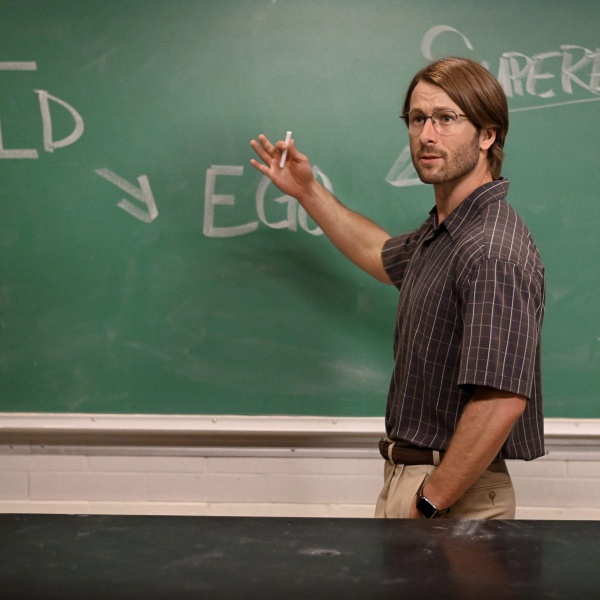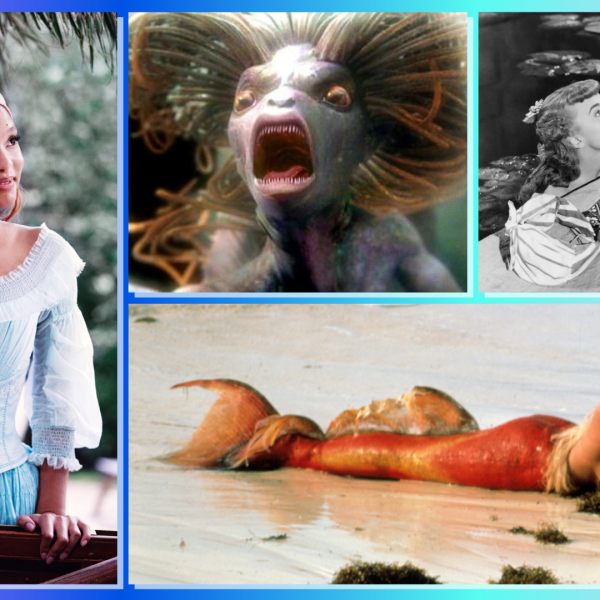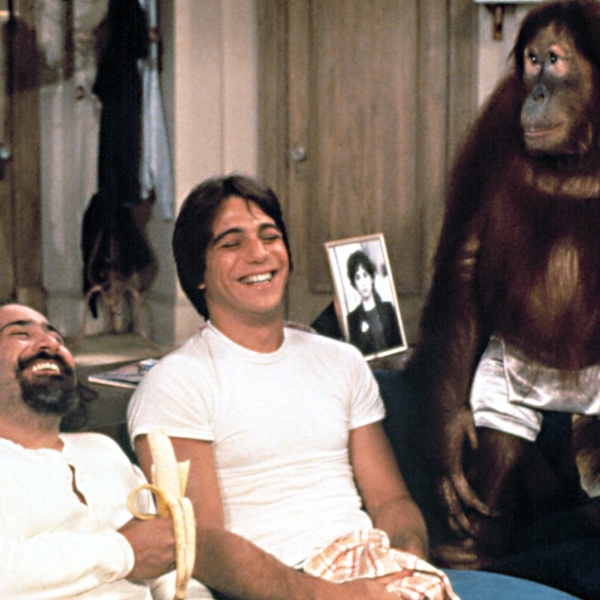Just as soldiers devour war movies and cops are always the first to pipe up about the latest police thriller, journalists have a soft spot for films focusing on the fourth estate. At their most positive, they can show the kind of crusading, truth-seeking journalists that the embittered hacks wanted to be when they started out (as Aaron Sorkin recently said, “‘All The President’s Men’ made journalists want to be rockstars”), and at their most negative, they provide a certain catharsis.
The investigative nature of the job means that a journalist can be the perfect peg on which to hang a thriller, and the wide-ranging nature of what they write about means it can be a lens through which to poke at a number of levels of society. Or it can just prove a background to a glossy workplace romantic comedy, like this week’s Rachel McAdams/Harrison Ford effort “Morning Glory.”
Unfortunately, “The Water Cooler,” Sorkin’s no-holds-barred look at the investigative journalism and the debaucherous after hours life at The Playlist remains stuck in development hell (frankly, we’re just not sure that Middle America is ready to see the kind of sexual depravity that went down at last year’s Christmas party). So instead, we’ve nodded to “Morning Glory” (which, unfortunately, isn’t quite what we hoped) by picking out a selection of noteworthy newsroom-set pictures.
We’ll get into it more later, but we’ve tried to focus on films about journalism, or at least heavily set in newsrooms, but we have moved the goalposts somewhat on occasion: if we were to focus purely on films like “Morning Glory,” this list would have been made up only of “Broadcast News,” which Roger Michell’s comedy relentlessly cribs from. But there were a few disqualifications that were made, as you’ll see later…
 “Ace in the Hole” (1951)
“Ace in the Hole” (1951)
While the great Billy Wilder — easily one of Hollywood’s greatest directors — is known for his classic humanistic films (“Stalag 17”), wonderful all-time comedies (“Some Like It Hot,” “The Apartment”) and estimable film noir (“Double Indemnity”), the Austrian-born American filmmaker might have been at his best when he was in a caustic and damning mood. Hence 1951’s acidic, bitter, and deeply cynical “Ace in the Hole,” starring Kirk Douglas as an opportunistic and shiftless journalist covering a story about a local Albuquerque man trapped in a cave trying to excavate ancient Indian artifacts (other similarly dark pictures “Sunset Boulevard” and “The Lost Weekend” are like-minded classics, but unlike those two it was his first solo writing effort without up-to-then frequent collaborator Charles Brackett). Once a hotshot New York journalist, Douglas’ Chuck Tatum character (fierce and fantastic in one of his best performances) has disgraced himself; his egoistic, boozing and short-cut happy ways have landed him in two-bit New Mexico. Frustrated and resentful at his new station in life, Tatum lights up when he hears about the trapped-man story believing it could be national news (think the Chilean miners story) and his ticket back to the big leagues. But so blinded by ambition and innately unscrupulous, Tatum begins to manipulate the local sheriffs into taking measures that will prolong the man’s rescue and therefore draw out the story out longer nationally and build more “will-he or won’t-he?” survival intrigue. Tatum’s exploitation of the situation only worsens — and only escalates and gets uglier — and soon the journalist realizes he’s far in over his head and there’s no turning back. A savage condemnation of media impropriety, not to mention overall human immorality, “Ace in the Hole” is easily Wilder’s bleakest statement of humankind. Of course, it was considered far too tart and misanthropic by audiences, became his first major box-office bomb and Paramount was so unhappy with the picture they changed its title to the seemingly more benign “The Big Carnival” just prior to its release. For years it remained AWOL on DVD and was one of the many lost treasures we all sought, but this wrong was righted by the Criterion Collection in 2007 when this fascinating and unforgettable film was finally given its proper due. [A]
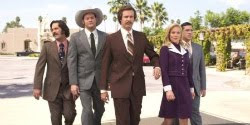 “Anchorman: The Legend Of Ron Burgundy” (2004)
“Anchorman: The Legend Of Ron Burgundy” (2004)
What more can be said about this already certified comedy classic that is still arguably the funniest, and definitely the most balls out absurd, Judd Apatow production to date? (It’s still the best Adam McKay/Will Ferrell picture hands down). Featuring a staggering array of comedic talent — Ferrell, Paul Rudd, David Koechner, Steve Carell, Vince Vaughn, not to mention the roster that shows up for the television news team royal tumble — at the height of their powers, firing off one liners as if they were on their deathbed (there was enough outtake footage to construct a crude companion film “Wake Up, Ron Burgundy: The Lost Movie”), “Anchorman” is an absurdist’s delight and a non-sequitur lover’s dream. But this isn’t just a bunch of random shit strung together (OK, sometimes it is); it works so well because Ferrell and his Channel 4 News Team perfectly jack up, exaggerate and mock the already ridiculous personas that populate locals news teams (seriously, hit YouTube or actually tune in to a few newscasts) and go for broke. And it works. Wonderfully. To the point where your ribcage will hate you. Compelling and rich, “Anchorman” smells of rich mahogany and gives viewers the hope that one day, you too, will find something as deep and meaningful as Brick Tamland’s love for lamp. [A]
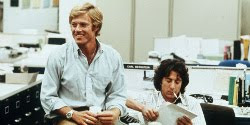 “All The President’s Men” (1976)
“All The President’s Men” (1976)
It’s hard to believe now, but there was a time when a newspaper could change history, when the printed word carried with it the weight of irrevocable truth and a couple of dogged reporters, through sheer persistence and the application of a little intelligence, could bring down a government. The Watergate affair and the fall of Nixon is truly one of the defining stories of the modern era, and in this, Alan J. Pakula’s finest hour, (though we do love “Klute” and are not averse to a little “The Parallax View” either) it gets the movie it deserves: talky, smart and never less than completely absorbing. It could so easily have been terrible — there’s no real action, no sex, no particular life-or-limb peril, and for anyone not paying close attention, the blizzard of names, dates and other minutiae on which the whole thing turns, could have proven a chore to navigate. A good thing then, that it’s practically impossible not to pay full attention — credit is due to Robert Redford and Dustin Hoffman for their committed performances as reporters Woodward and Bernstein (how many journalists since have chosen their career based on these portrayals?), but surely, the lion’s share of kudos must go to the unparalleled screenwriting of William Goldman, and the taut, inspired direction by Pakula. It’s a fascinating snapshot of a working newsroom that, just for a moment, became pretty much the center of the universe and a thrilling and very American example of how, armed with nothing but integrity, faith in public justice and a typewriter, a few good men can literally make all the difference in the world. [A+]
 “Broadcast News” (1987)
“Broadcast News” (1987)
A romantic comedy for the smart and cynical, James L. Brooks’s “Broadcast News” somehow seems even more relevant today than it was in 1987. Holly Hunter’s news producer Jane Craig laments fluff-as-news, but what would she think about the 24-hour-news cycle and editorials disguised as news in 2010? She’s a Sorkin-esque heroine, who succeeds in her professional life while her relationships are an inversely proportional mess. Jane falls for the handsome but brainless anchor-in-training Tom Grunick (William Hurt), while her longtime friend Aaron Altman (Albert Brooks) pines away. Tom might have all the looks, but Aaron gets all the lines, and the scenes where he confesses his love and condemns his rival have some of the best dialogue this side of the stage — it’s almost Chekhovian in its heartbreaking quality. The characters in “Broadcast News” aren’t afraid to be downright mean, but they’re never anything less than watchable and likable thanks to their flaws, and all three actors, particularly the magnificent Hunter, give career-best performances. And the ending, still a bitter pill to swallow for some, is truthful in a way that’s hard to find in rom-coms these days. [A-]
 “Good Night and Good Luck” (2005)
“Good Night and Good Luck” (2005)
Truth can be stranger than fiction, which is why director George Clooney opted for archive footage of Senator Joseph McCarthy to serve as the boogeyman for this historical drama, which recounts journalist Edward R. Murrow standing up against the bullying from the House of Unamerican Activities Committee. David Strathairn gives a powerful performance as the driven Murrow, who understood that the truth was more powerful than any weapon against what was a leviathan of mistruth in the movement to witch-hunt perceived Communism. Coming from a television background, Clooney utilized several in-camera effects to illustrate the power dynamics and socialization of the broadcast news operations of an earlier era, creating a masterpiece that works even better as a teaching tool to help the youth of tomorrow better understand how we still seem to fall prey to the same scare tactics of yesterday. [A]
 “His Girl Friday” (1940)
“His Girl Friday” (1940)
Much attention has (rightfully) been paid to the whiplash-inducing dialogue and the fizzy chemistry between leads Cary Grant and Rosalind Russell in this classic film from Howard Hawks. Breezing past the page-a-minute average of most screenplays, “His Girl Friday” is based on Ben Hecht’s stage play “The Front Page.” The adaptation, by Charles Lederer, got an injection of energy from switching the two main characters from a pair of male journalists to feuding exes, particularly since those exes are played by Grant and Russell, a pairing that matches Grant’s work with both Hepburns and Irene Dunne for sheer fire. The romance is as fast-paced as the dialogue, but viewers shouldn’t overlook the contributions of the other room of journalists in the film who add character and a bit of authenticity. Though some of it feels decidedly dated (remember when newspapers mattered?), it manages to be as fresh and funny as it was 70 years ago. [A]
 “The Insider” (1999)
“The Insider” (1999)
Michael Mann’s name became synonymous with intelligent, impeccably crafted adult mainstream films after the incredible one-two punch of his epic crime film masterpiece “Heat” and “The Insider,” one of the many great films released in 1999 (seriously, go back and look, it was an insanely strong year for cinema). Though considered a minor financial failure at the time, “The Insider,” a film about the media that’s easily one of the best of this genre, attracted the attention of the Oscars (receiving seven nominations, winning none, somehow), and proved Mann was a director whose every next film was something to get excited about. Telling the true, thoroughly researched tale (Mann and co-writer Eric Roth worked diligently to get as much right as possible, adapting from a Vanity Fair article called “The Man Who Knew Too Much”) of tobacco whistleblower Jeffrey Wigand (Russell Crowe, in one of his finest, schlubbiest performances) and his appearance on 60 Minutes that was at first altered in 1995 and then aired proper in 1996, the film also showed, if it wasn’t already obvious, that Mann is the rare director capable of hitting that sweet spot between art and entertainment. He hasn’t quite followed through on the promise he showed from the mid-to-late ‘90s, though “Collateral” and “Public Enemies” were strong efforts, but any filmmaker capable of making “The Insider” is surely deserving of our anticipation for his next effort. [A]
 “Network” (1976)
“Network” (1976)
Making a big-screen satire is always risky business — so often, the subject matter can seem stale by the time a film’s been through the multi-year process from inception to release, and that’s even if the film’s any good at all, and frequently they aren’t. For every “Dr. Strangelove,” there are a dozen “American Dreamz” or “Death to Smoochy” s. So it’s especially rare to find an example of the genre that not only connected at the time (winning four Oscars), but actually seems more and more relevant as time goes on. In an age of news personalities that defy belief, from Glenn Beck to Keith Olbermann, this film is as vital now as the day it was released. And on every level, it is impeccably executed: Sidney Lumet and Paddy Chayefsky are such a symbiotic director/writer partnership, perfectly complementing each other’s strengths, that it’s easy to forget that this was their only collaboration. And the acting across the board is outstanding: Peter Finch, Faye Dunaway and Beatrice Straight all won Oscars (Finch’s was sadly posthumous), but Robert Duvall, the truly outstanding William Holden and, in an unforgettable, endlessly quotable one-scene cameo (“You have meddled with the primal forces of nature and YOU WILL ATONE!”), Ned Beatty are more than their matches. A capsule review is by no means enough to capture the film in full — we could go on for another few thousand words without drawing breath. Suffice to say, it remains, 35 years on, the definitive film about TV journalism. [A+]
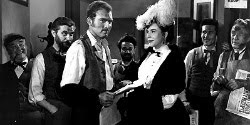 “Park Row” (1952)
“Park Row” (1952)
This early effort from writer/director Sam Fuller, made one year before the solid “Pickup On South Street” is probably most easily described as “Gangs Of New York” if it were about the paper biz of the era, instead of turf warfare. Grimy and gritty, the film takes place in the 1880s and pits an idealistic young journalist, Phineas Mitchell (Gene Evans) who, tired of the dirty pool of the state of newsprint, launches his own paper but comes right up against Charity Hackett (Mary Welch), owner and publisher of the longstanding The Star. And things get ugly, fast. Street fights, bar brawls, sabotage and even death come in the wake of the two papers battling for dominance and readership. However, most surprising, is the streak of sentiment that runs throughout. Fuller is no softie, but in “Park Row,” the director delivers what would be the closest thing to a Frank Capra film he would ever make, albeit in his own street-level, bare knuckled style. Immensely entertaining, this is one of the best and under-appreciated newspaper films. [B+]
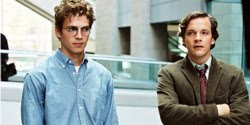 “Shattered Glass” (2003)
“Shattered Glass” (2003)
“Are you mad at me?” Writer/director Billy Ray hinged the lead character of his film, a dramatic account of the former New Republic writer Stephen Glass’s rise and fall, on these words, taken from the September 1998 Vanity Fair article by H. G. Bissinger on which the film is based. That infuriating question is asked often by Glass in the film, here played by Darth Vader himself, Hayden Christensen, skillfully showing the manipulative nature of this fascinating character. Ray’s accomplishments are many in this real-life tale. The casting is aces, but getting the one and only good performance out of Christensen to date, who uses that grating, whiny voice to effectively portray the sociopathic Glass, is a marvel. The filmmaker also nails the sensation and excitement of chasing a story and working in a news room. When it’s discovered that many of Glass’ articles have been made up (he later admitted 27 of his 41 published pieces in the bi-monthly were at least partially or completely fabricated), we’re right there on the hunt with the reporters trying to take him, while also seeing the ramifications the investigation has on the staff of The New Republic. “Shattered Glass” is a confident work for a first-time director (though Ray has been writing scripts in Hollywood for almost two decades now), coming from someone so clearly enamored with journalism. Ray’s greatest achievement is how he deftly handles the transition of Glass from protagonist to antagonist, slowly revealing the film’s hero to be New Republic Editor Charles Lane, played by Peter Sarsgaard, who absolutely steals the movie in a fantastic performance. [B+]
 “State of Play” (2009)
“State of Play” (2009)
First up: Kevin Macdonald’s “State of Play” isn’t a patch on the six-part BBC TV series that inspired it. It isn’t as funny, for one, while the richness and depth of the supporting cast (which originally included familiar faces like Bill Nighy, James McAvoy, Kelly Macdonald, Philip Glenister and Marc Warren) isn’t matched, even with fine showings from the likes of Helen Mirren, Rachel McAdams and a particularly good cast-against-type Jason Bateman. But that doesn’t mean that the film doesn’t have its charms. For one, the screenplay (by Matthew Michael Carnahan, Tony Gilroy and Billy Ray, with an uncredited polish by Peter Morgan) is actually kind of a remarkable adaptation, condensing most of the dense plotting admirably, while trimming digressions, and sensibly dumping the romance between journalist Cal (Russell Crowe) and politician Stephen Collins’ wife (Robin Wright Penn). Macdonald brings a ’70s-inflected zip to proceedings, and it’s expertly paced. But the film’s most notable for two things: first of all, it’s the first journalism-based movie to deal with the coming death of the printed paper, pitting Crowe’s veteran muckraker against Rachel McAdams’ new-school blogger, and it gives the picture a little extra fizz. But the film’s true pleasure comes in Crowe’s performance — on paper it’s a rerun of the schlubby investigator he played in “American Gangster,” but Crowe looks like he’s having a ball, and his languid, relaxed charm reminds you that, before the temper tantrums, he promised to be a once-in-a-generation movie star. [B]
 “The Paper” (1994)
“The Paper” (1994)
Ron Howard’s comedy-drama, his second flop in a row after the Tom Cruise/Nicole Kidman disaster “Far & Away” (but admittedly far superior to that film), has plenty going for it. Its depiction of a faintly sleazy New York tabloid (basically The Post) has, in places, a ring of authenticity to it (David Koepp co-wrote the script with brother Stephen, a writer at Times), and for a film over a decade and a half old, it’s strangely prescient about the situations newspapers now find themselves in. There’s also a terrific central performance from Michael Keaton; one that displays his tremendous charm and comic timing (which we were reminded of this year in his something of a comeback after “Toy Story 3” and “The Other Guys”). Randy Quaid’s performance as a paranoid, gun-toting columnist also gave us a cheap laugh on re-watching it. But otherwise, it’s kind of a washout, and the principle problem is Howard; as usual, he gives a slick, sentimental Hollywood sheen to the picture that rids it of anything close to truthfulness. There’s also an odd dichotomy between the crusading semi-liberal sub-plot about a pair of black teenagers wrongly accused of murder (the filmmakers don’t even have the dramatic sense to hint at ambiguity, demonstrating their innocence from the off), and the oddly conservative worldview of the rest of the film — the depiction of the women in the film is, frankly, disgraceful. One for die-hard Keaton fans and newsroom picture obsessives only, to be honest. [C]
 “Zodiac” (2007)
“Zodiac” (2007)
To regular readers it will not be news that we almost unconditionally love David Fincher (the ‘almost’ being down to ‘Benjamin Button’ — a tedious misstep if ever there was one), and that we’ll take any opportunity to bang on about his underrated (in his oeuvre anyway) 2007 serial killer film. Granted, it’s not as showy or as sensationalist as 1995’s “Se7en” and lacks the punchy, pulpy, pop-culture feel of “Fight Club,” but as an absorbing and meticulous procedural, speckled with strong performances and elevated by pretty sublime camerawork (it’s his one collaboration with master cinematographer Harris Savides), “Zodiac” proves that the director can do depth and thoughtfulness in addition to his more obvious talents. But perhaps these are qualities that people didn’t want or expect of a serial killer movie, which is why its inclusion here makes sense. It may be based on a famous true unsolved case, but “Zodiac” isn’t about murder or the murderer – it’s about obsession and the long lonely hours that men in offices and at desks put in trying to catch him – these were the killer’s other, unheralded victims. The San Francisco Chronicle’s newsroom may not be the sole, or even the primary setting of the film, but as a place of occasional revelation but more often of unending slog and unrewarded sacrifice (a lot like Playlist Towers), it is a perfect location for the film’s downbeat, ambiguous yet strangely nourishing themes. [A-]
Honorable Mentions: We had to disqualify a number of films to keep the list down — as we said, journalists have been protagonists in countless films, and we’d be here all day otherwise. Anything involving foreign correspondents wasn’t quite what we were after, involving journalists on the ground rather than behind a desk, so the likes of “The Year of Living Dangerously,” “Salvador” and, well, “Foreign Correspondent,” all very strong works, were left out in the cold. Similarly, “Sweet Smell of Success” is an almost impossibly great film, but not quite what we were after, and the likes of “Fletch” and “Fear and Loathing in Las Vegas,” while involving reporter protagonists, really aren’t about journalists. Even “Citizen Kane,” despite having a newspaper proprietor for an anti-hero, doesn’t really get into the nuts and bolts of putting out a paper. The Nick Nolte/Julia Roberts screwball comedy “I Love Trouble,” meanwhile, was disqualified for being rubbish.
There were a few films that did qualify not on the list that are worth a mention. “Absence of Malice” is one of Sydney Pollack’s best films, a complex look at the consequences of the news, with a tremendously ambiguous performance from Paul Newman, and Richard Brooks’ “Deadline – U.S.A.” is a decent noirish thriller, if far from Humphrey Bogart’s best work. “The Front Page,” the basis for “His Girl Friday,” has seen a number of adaptations, from the fairly enjoyable 1931 version (not a patch on Hawks’ film), to the disappointing 1974 Billy Wilder version, and the woefully miscast TV redo “Switching Channels” with Burt Reynolds and Kathleen Turner. And there’s a wealth of films, including many from Film Forum’s special season earlier in the year, like “Five Star Final,” “The Big Clock” and Fritz Lang’s “While The City Sleeps,” which we simply weren’t able to track down in time. As usual, send a telegram to the metro editor with your own suggestions. – Oliver Lyttelton, Kevin Jagernauth, Kimber Myers, Jessica Kiang, Drew Taylor, Rodrigo Perez

